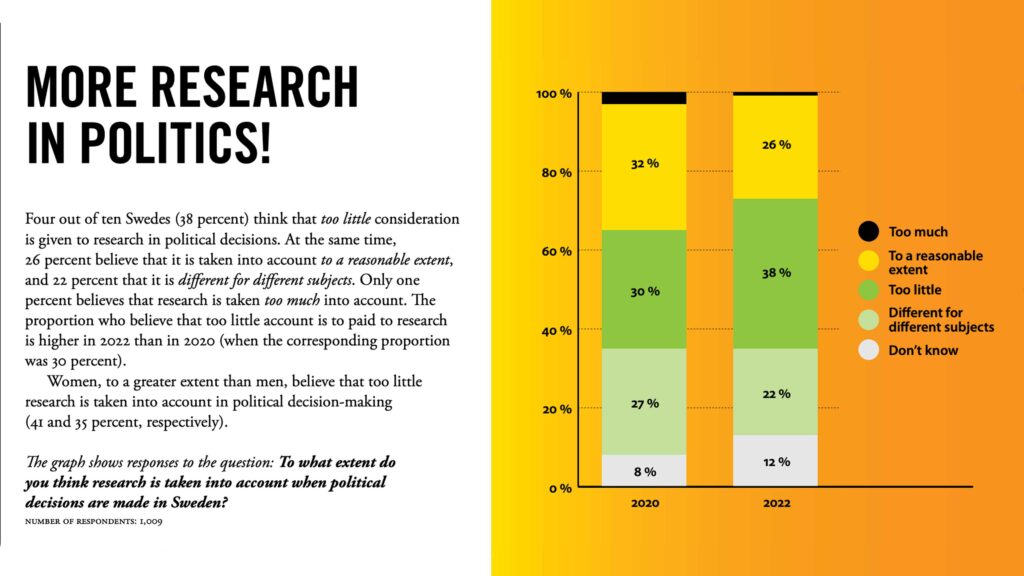Swedes’ confidence in research is at a record high, and the majority believe that politicians used too few scientific facts during the Swedish election campaign. These are some of the results of the 2022/23 VA Barometer, conducted by the Swedish non-profit organisation VA (Public & Science). It is the 21st Barometer since it was first conducted in 2002.

”We see that the Swedish public wants policies to be better grounded in science and facts. Swedes continue to have high confidence in researchers and want more research to be used in politics,” said Lina Rådmark, a researcher at VA (Public & Science) responsible for the report.
The VA barometer investigates the Swedish public’s attitudes towards science and researchers, and has been conducted annually since 2002. The study is based on telephone interviews with approximately 1,000 people aged 16–74.
Record high confidence in research after the pandemic
Swedes’ confidence in research and researchers remains high. As many as 87 percent say that they have fairly or very high confidence in researchers at Swedish universities.
”We saw a strengthening of confidence in researchers during the Covid pandemic. It is reassuring to see that confidence remains at a high level,” says Lina Rådmark. This year, 84 percent responded that they have fairly or very high confidence in research in general, an increase of seven percentage points compared to last year’s survey and the highest value since the question was first asked in 2017.
Women have higher confidence
This year’s survey also shows differences between the sexes. Eighty-nine percent of women, compared to 80 percent of men, have fairly or very high confidence in research. Women have had more confidence in research than men since 2020. Prior to that, no difference was seen between the sexes.
“It is interesting to see differences between women and men, both in terms of their level of confidence in research and researchers and in their views of politics and research. It is something that would be interesting to investigate further,” said Lina Rådmark.
One in five Swedes have participated in research
This year, questions were also asked about the public’s involvement in research. One in five Swedes (19 percent) have at some point been involved in a research project. Of those who have participated in research, almost half have been a subject in a research study. Swedes with a university education have been involved in research to a significantly greater extent than those who do not have a university education (31 and 10 percent, respectively).Another important factor is having a close acquaintance who does research. Those with a family member, relative or friend who works as a researcher have participated in research to twice the extent compared to those who don’t have a researcher close by (30 and 14 percent, respectively).
Perception that values steer politics
In this year’s survey, additional questions were asked about public confidence in politicians, as well as what the Swedes believe politicians base their opinions and positions on. Three out of ten Swedes have fairly or very high confidence in politicians in the Swedish Parliament, and only two percent feel that Swedish politicians base their opinions and positions predominantly on facts. Instead, a majority (54 percent) believe that opinions are primarily based on values. Women, to a greater extent than men, believe that too little consideration is given to research in political decision-making (41 and 35 percent, respectively), and the perception that politicians’ opinions are based on values is more common among younger people and those with a university education.
“At a time when there is a lot of talk about the importance of evidence-based decision-making, it is interesting that such a large percentage of Swedes feel that politicians’ opinions are based more on values than facts,” commented Lina Rådmark.
